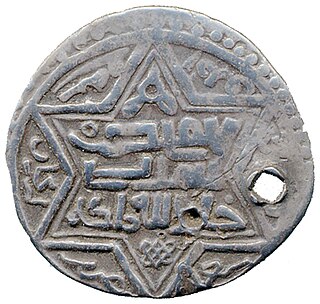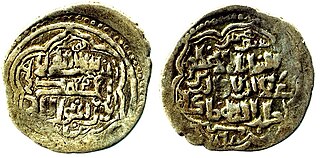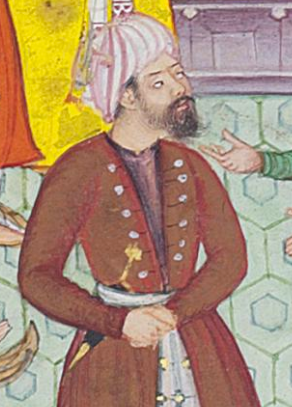Ala al-Din Ali may refer to:
- Ala al-Din Ali, also known as Zia al-Din Ali, last Sultan of the Ghurids
- Ala al-Din Ali of the Eretnids (died 1380), third Sultan of the Eretnids
- Ala al-Din Ali Dulkadir (died 1426), Dulkadirid prince
Ala al-Din Ali may refer to:
Ala, ALA, Alaa or Alae may refer to:
Aladdin is a male given name which means "nobility of faith" or "nobility of creed/religion". It is one of a large class of names ending with ad-Din. The name may refer to:

Taj al-Din Yildiz was a Turkic ghulam of the Ghurid dynasty, who, after the death of Sultan Muhammad of Ghor, became the de facto ruler of Ghazni, while, however, still recognizing Ghurid authority.
Izz ud-Din, Izz al-Din is an Arabic male given name meaning "high rank of the Islamic religion/faith".

The Eretnids were a dynasty that ruled a state spanning central and eastern Anatolia from 1335 to 1381. The dynasty's founder, Eretna, was an Ilkhanid officer of Uyghur origin, under Timurtash, who was appointed as the governor of Anatolia. Some time after the latter's downfall, Eretna became the governor under the suzerainty of the Jalayirid ruler Hasan Buzurg. After an unexpected victory at the Battle of Karanbük, against Mongol warlords competing to restore the Ilkhanate, Eretna claimed independence declaring himself the sultan of his domains. His reign was largely prosperous earning him the nickname Köse Peyghamber.

Kadi Ahmad Burhan al-Din was vizier to the Eretnid rulers of Anatolia. In 1381, he took over Eretnid lands and claimed the title of sultan for himself. He is most often referred to by the title Qadi, a name for Islamic judges, which was his first occupation.
Baha al-Din Muhammad-i Walad, more popularly known as Sultan Walad, was a Sufi, Hanafi Maturidi Islamic scholar and one of the founders of the Mawlawiya (مولویه) order.
Qutb ad-Din or Qutb-ud-Din is an Arabic male given name translated as 'the pivot of the faith' or 'axis of the faith'.

The Emirate of Erzincan was an emirate that controlled much of Eastern Anatolia in the fourteenth and early fifteenth centuries.

Ala al-Din Eretna was the first sultan of the Eretnids, reigning between 1343–1352 in central and eastern Anatolia. Initially an officer in the service of the Ilkhanate officer Chupan and his son Timurtash, Eretna migrated to Anatolia following Timurtash's appointment as the Ilkhanid governor of the region. He took part in Timurtash's campaigns to subdue the Turkoman chiefs of the western periphery of the peninsula. This was cut short by Timurtash's downfall, after which Eretna went into hiding. Upon the dissolution of the Ilkhanate, he aligned himself with the Jalayirid leader Hasan Buzurg, who eventually left Anatolia for Eretna to govern when he returned east to clash with the rival Chobanids and other Mongol lords. Eretna later sought recognition from Mamluk Egypt to consolidate his power, although he played a delicate game of alternating his allegiance between the Mamluks and the Mongols. In 1343, he declared independence as the sultan of his domains. His reign was largely described to be prosperous, with his efforts to maintain order in his realm such that he became known as Köse Peyghamber.
Ala al-Din Husayn was king of the Ghurid dynasty from 1149 to 1161. He was one of the greatest Ghurid kings, and it was during his reign that the Ghurid dynasty rose to prominence.
Ala al-Din Aliibn Shuja al-Din Mohammad, also known as Zia' al-Din Ali, was the last Sultan of the Ghurid dynasty from 1214 to 1215. He was the cousin and successor of Ala al-Din Atsiz.
Fakhr al-Din Qutlugh-bey was the second Aq Qoyunlu bey, ruling from 1362-1389. His full name was Haji Fakhr al-Din Kutlug ibn Tur Ali-bey.
Ahmad ibn Kutlug, was the third bey of the Aq Qoyunlu confederation (1389-1403).

Ghiyath al-Din Muhammad I was the second Sultan of the Eretnids in central and eastern Anatolia, ruling from 1352 until his death. He was enthroned at a young age and struggled to maintain his authority over the state his father, Eretna, had founded. Although he was initially preferred over his older brother Jafar, Muhammad was deposed by his emirs early into his reign and was replaced by Jafar. After some time in exile, he returned, restored his throne, and killed his brother. Though, throughout his reign, he dealt with rebellions and lost land to local Turkoman lords, the Dulkadirids, and the Ottomans. After putting an end to his former vizier Khoja Ali Shah's revolt and returning to the capital, Kayseri, Muhammad was murdered by his emirs, who crowned his son Ali as the new sultan.
Ghars al-Din Khalil Beg was the second ruler of the Turkoman Dulkadirid principality, reigning from 1353 to 1386. Having actively taken part in military pursuits during his father Zayn al-Din Qaraja's rule, he further expanded the influence of the Dulkadirids and clashed with the Mamluk suzerainty, contributing to the growing tension between the Mamluks and Dulkadirids. Raids by Khalil in the northern frontier with the Mamluks prompted the Mamluk sultan to provoke dissension in the Dulkadir dynasty. The sultan incited Khalil's brother Sarim al-Din Ibrahim, who sought Mamluk recognition for his domains near Harpoot, to assassinate the ruler, Khalil. Ghars al-Din was killed in an ambush and was succeeded by his other brother Shaban Suli.

Ala al-Din Ali was the third Sultan of the Eretnids ruling from 1366 until his death. He inherited the throne at a very early age and was removed from administrative matters. He was characterized as particularly keen on personal pleasures, which later discredited his authority. During his rule, emirs under the Eretnids enjoyed considerable autonomy, and the state continued to shrink as neighboring powers captured several towns. The capital, Kayseri, temporarily came under Karamanid control. Kadi Burhan al-Din rose to power as the new vizier and dispatched Ali to lead several campaigns, most of which were unsuccessful. Ali died of the plague in Kazova in an expedition to subdue Shadgeldi, the emir of Amasya.

Mutahharten, also known as Taharten, was Emir of Erzincan from 1379 until his death. Erzincan was previously ruled by emirs who exercised autonomy as vassals of the Eretnids. Mutahharten claimed sovereignty from the Eretnids when he assumed power, which prompted the Eretnid Sultan Ala al-Din Ali to go on an expedition to reinstate his authority over Erzincan. While Mutahharten ultimately repelled Ali, the latter was replaced by his vizier Kadi Burhan al-Din, who was determined to restore the sultanate's former boundaries. Burhan al-Din and Mutahharten were involved in a long-lasting conflict. Upon the advent of Timur, Mutahharten contently swore allegiance and halted his campaigns in Anatolia, but Timur's departure reignited the conflict between Mutahharten and Burhan al-Din. Often overpowered by his enemies, Mutahharten forged alliances with various groups but did not hesitate to turn against his former allies, such as the Aq Qoyunlu, when he saw fit. On the other hand, Mutahharten's relations with the Empire of Trebizond and his Christian subjects were consistent, as he favored them for their economic contribution to his realm through trade.
Ghiyath al-Din Muhammad (1140–1203) was the Sultan of the Ghurids from 1163 to 1203.
Taj al-Din Chelebi was Beg of Limnia in northeastern Anatolia from 1367 until his death.